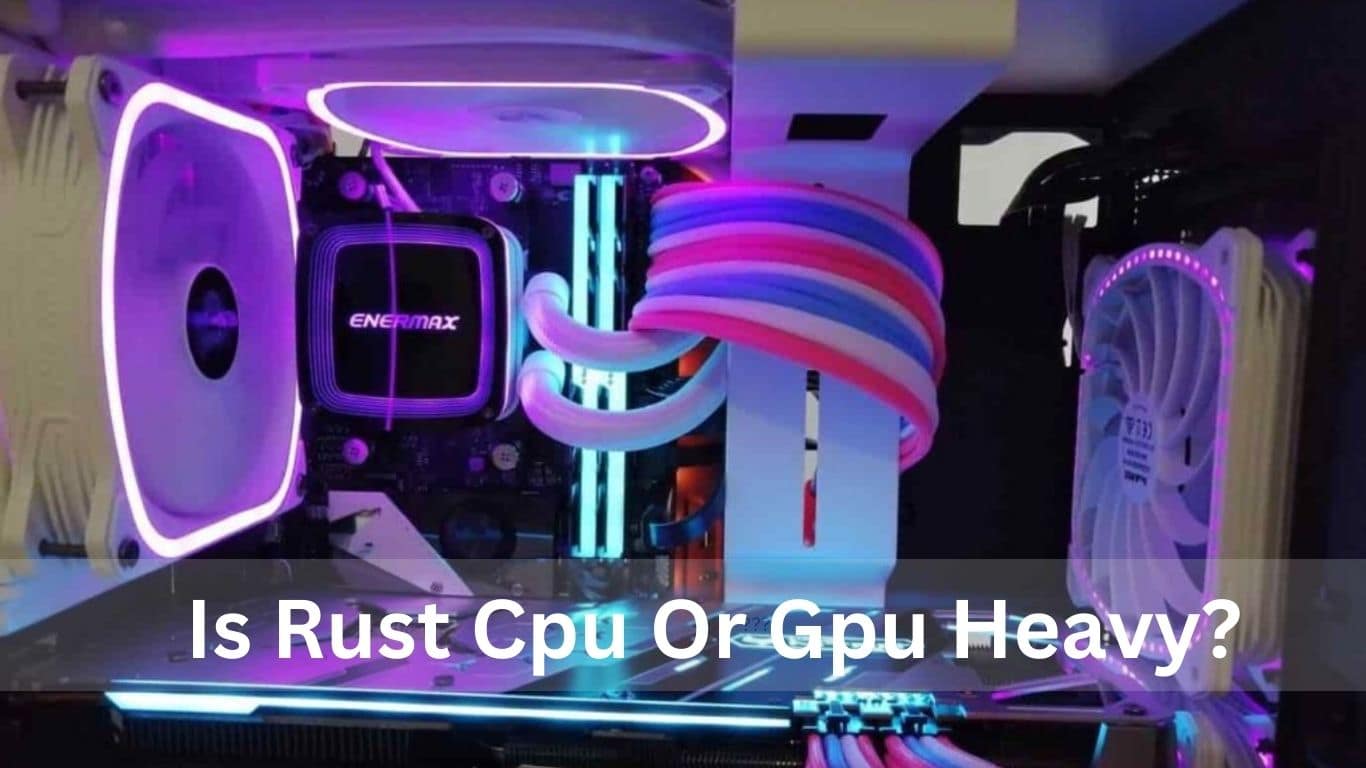When I started using Rust, I noticed it depends on what you do. CPU handles game logic and AI, while the GPU works for graphics. It balances between both.
Is Rust CPU or GPU Heavy? (short answer)
Yes, Rust is more CPU-heavy than GPU-heavy. It mainly depends on the CPU for most tasks, while the GPU is less involved in general gameplay or logic processing.
This article will explore whether Rust relies more on CPU or GPU performance.
Introduction to Rust Programming Language:
Before exploring whether Rust is CPU- or GPU-heavy, it’s important to know its basics. Rust is popular for its memory safety and zero-cost abstractions, ideal for systems programming and performance-focused applications.
Understanding CPU and GPU:
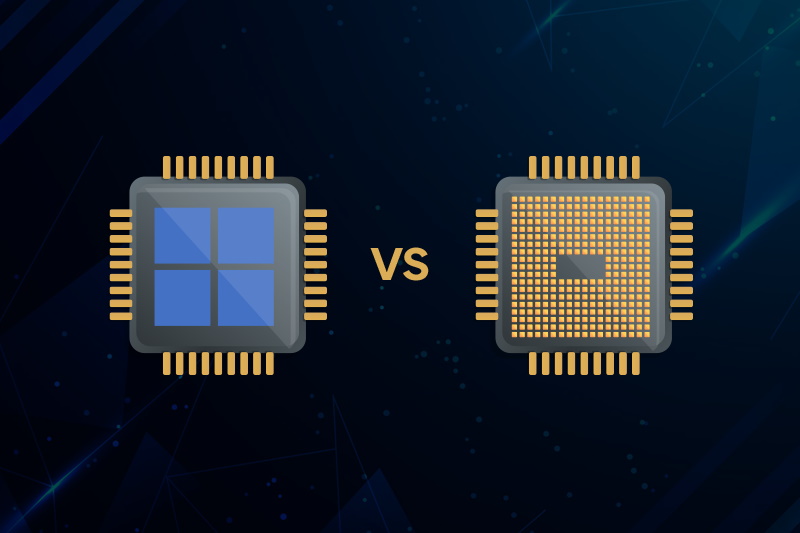
CPUs and GPUs are key parts of modern computers. CPUs are great at handling tasks in order and doing complex calculations, while GPUs are built for parallel processing and handling graphics-heavy tasks.
Role of CPU in Gaming
How CPU Affects Game Performance?
The CPU is important for game performance because it handles game rules, player actions, and physics. A faster CPU can improve frame rates and reduce loading times, making games run smoother and better, especially in online multiplayer settings.
Examples of CPU-intensive Tasks
- Video Editing: Making and changing videos takes a strong CPU.
- 3D Graphics: Creating detailed images for games or animations is heavy work.
- Data Analysis: Working with large amounts of data requires high CPU usage.
- Game Physics: Calculating physics in games, especially with many objects interacting, is CPU-intensive.
Role of GPU in Gaming
How GPU affect game Performance?
A GPU (Graphics Processing Unit) handles the visuals in games. It processes images, lighting, textures, and effects. A strong GPU allows smoother gameplay, higher frame rates, and better graphics quality. Weak GPUs cause lag, lower resolution, and slow frame rates, hurting game performance.
Examples of GPU-intensive tasks
- High-resolution gaming
- 3D rendering and modeling
- Video editing
- Virtual reality (VR)
- Machine learning and AI tasks
These tasks push the GPU to work hard.
Rust’s hardware requirements
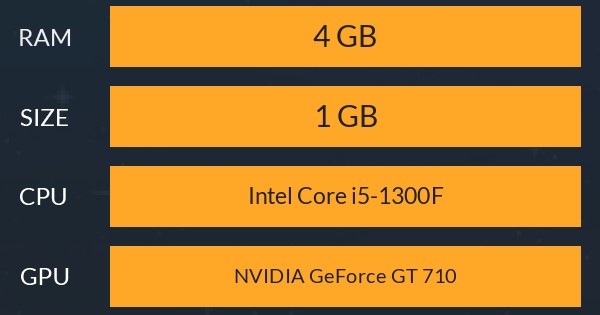
Official Minimum and Recommended Requirements
Official minimum requirements mean the game will work with basic hardware, but it might not run smoothly. Recommended requirements suggest stronger hardware for smoother gameplay and better visuals, providing a more enjoyable gaming experience overall.
Analysis of These Requirements
The minimum requirements let a game run, but often with low graphics and slower performance. Recommended requirements mean you can enjoy smoother gameplay with better graphics. Having hardware above the minimum makes games more fun and less frustrating to play.
CPU usage in Rust
Specific CPU Tasks in Rust
In Rust, the CPU handles several key tasks:
- World Generation: Creating the game’s large, open world.
- Physics Calculations: Managing player movements, object collisions, and interactions.
- AI Processing: Controlling NPC behavior like animals.
- Multiplayer Syncing: Handling online connections and player interactions.
These tasks require CPU power for smooth gameplay.
Impact of CPU on Gameplay
The CPU controls many game actions, like character movement, AI, and world physics. A strong CPU makes gameplay smoother and faster. If the CPU is weak, the game may lag, freeze, or respond slowly to commands.
GPU Usage in Rust
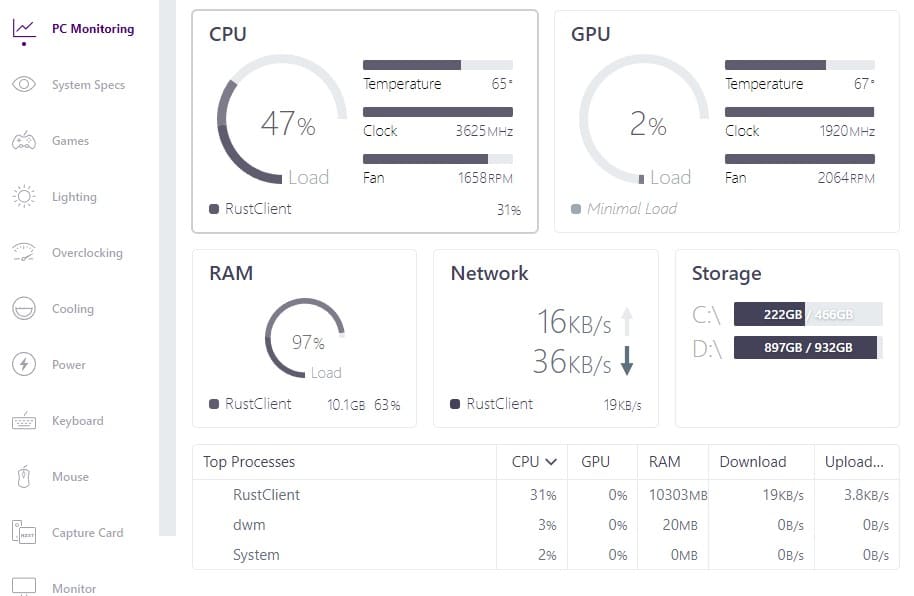
Specific GPU Tasks in Rust
- Rendering Graphics: Displaying the game’s detailed world and textures.
- Lighting and Shadows: Creating realistic lighting effects.
- Particle Effects: handling explosions, smoke, and fire.
- Frame Rate Management: Ensuring smooth visuals during gameplay.
These tasks heavily depend on the GPU for better graphics and smoother performance.
Impact of GPU on Gameplay
The GPU affects how well a game looks and runs. A strong GPU makes gameplay smoother, with high-quality graphics, faster frame rates, and realistic effects. A weak GPU can cause lag, poor visuals, and slower gameplay.
Is Rust CPU Heavy?
Yes, Rust is CPU-heavy. Its performance depends on how well it handles memory and calculations. Rust is efficient like C or C++, using multi-threading to optimize CPU usage for many tasks.
Is Rust GPU Heavy?
No, Rust isn’t primarily GPU-heavy like CUDA or OpenCL. However, it has libraries that let developers use the GPU efficiently. With its evolving ecosystem, Rust’s potential for handling GPU-heavy tasks is growing steadily.
Is Rust CPU or GPU heavy?
Rust’s performance depends on how it uses CPU and GPU resources. Unlike C or C++, Rust offers memory safety without losing speed, thanks to its ownership model and borrow checker, which manage memory efficiently.
CPU-Intensive Operations in Rust:

Rust is great for CPU-heavy tasks because it manages memory well and gives low-level control. You can run algorithms, process data, and do math tasks in Rust with strong performance, using the CPU efficiently.
GPU Intensive Operations in Rust:
Although Rust mainly focuses on CPU tasks, it supports GPU programming with libraries like gfx-rs and wgpu. Developers can use GPUs in Rust for parallel processing, scientific computing, and machine learning tasks.
Factors Affecting Rust’s Performance:
1. Parallelism and Concurrency:
Rust’s concurrency model helps developers write code that uses multiple CPU cores efficiently. Rust supports building scalable and responsive applications with features like threads and async/await.
2. Memory Management:
Rust’s ownership system helps prevent memory bugs like null pointers and data races. It applies strict rules during compilation, ensuring memory safety without slowing down programs, and making it efficient for CPU and GPU tasks.
3. Optimization Techniques:
To optimize Rust code, developers use methods like loop unrolling, inline assembly, and compiler optimizations. These techniques help boost performance in tasks that heavily use CPU and GPU resources.
Comparison with Other Programming Languages:
Rust is different from languages like C, C++, and Python because it combines safety and performance. While C and C++ give you control but can be unsafe, Rust keeps your code safe without slowing it down. Python is easier to use but slower for heavy tasks.
Is Rust Running Slow? How to Make Rust Load Faster?
Rust isn’t slow by itself, but you can make it run faster with some tips. To improve loading speed, try profiling your code to find bottlenecks, optimize your algorithms, and use Rust’s concurrency features. These steps can boost efficiency and cut loading times.
Rust’s GPU Utilization:
Rust’s ability to use GPUs depends on the libraries you choose. With crates like ‘gfx-hal’ and ‘wgpu’, developers can tap into GPU power for tasks such as parallel processing, rendering graphics, and machine learning. This makes Rust a strong option for high-performance applications.
Rust’s CPU Utilization:
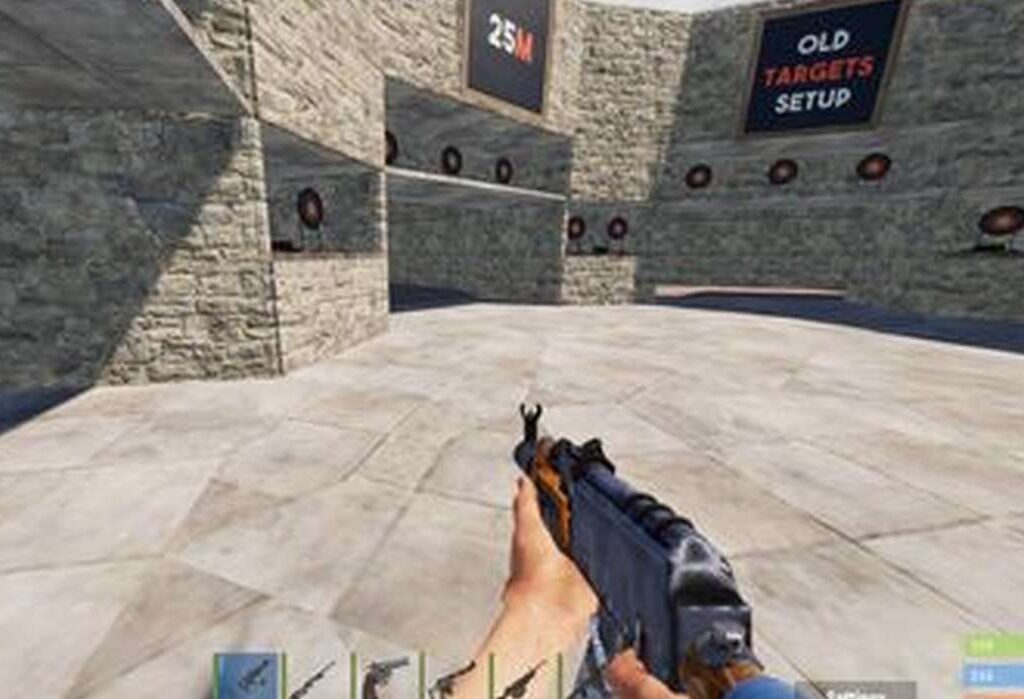
Rust’s CPU usage depends on how well you write and run your code. By using Rust’s features, like zero-cost abstractions and safe concurrency, you can optimize CPU performance. Also, profiling tools help find and fix slow parts of your code.
Why Is Rust Running Slow? 5 Possible Reasons
Rust can run slowly for several reasons:
- Inefficient algorithms: Using poor algorithms can slow down execution.
- Excessive Memory Usage: High memory consumption may lead to performance issues.
- Suboptimal Code Organization: Poorly structured code can hinder efficiency.
- Lack of compiler optimizations: Not enabling optimizations may slow down the code.
- Inefficient I/O Operations: Slow input/output operations can impact overall speed.
Using profiling tools helps developers spot these issues and improve performance effectively.
How to Speed Up Rust: 10 Tips
- Profile Code: Find slow parts of your code.
- Optimize Algorithms: Choose better algorithms and data structures.
- Use Concurrency: Take advantage of Rust’s concurrency features.
- Enable compiler optimizations: Turn on optimizations when compiling.
- Minimize Memory Use: Reduce unnecessary memory allocations.
- Efficient I/O: Optimize input and output operations.
- Leverage Crates: Use performance-focused crates for critical tasks.
- Avoid Cloning: Don’t create unnecessary copies of data.
- Prefer Stack Allocation: Use stack memory instead of heap memory when possible.
- Stay Updated: Keep up with Rust’s new features and best practices.
What are the system specifications for Rust?
Rust doesn’t have strict system requirements and can run on multiple platforms, including Windows, macOS, and Linux. The basic needs are a compatible operating system and enough hardware resources, such as a decent CPU and RAM, to ensure smooth performance.
Flipboard not loading articles: fixes & workarounds
The Flipboard isn’t loading articles; try these fixes:
- Restart the app by closing it and reopening or refreshing the page.
- Make sure your internet connection is stable.
- Clear the cache and data in your device’s settings.
- Update to the latest version of Flipboard.
- If the issue persists, uninstall and reinstall the app.
What does hover note mean in Minecraft?
In Minecraft, a hover note is a tooltip that shows up when you move your cursor over an item or block. It gives you quick information about the item’s name, how to use it, and its features, helping you understand it better in the game.
How to Make Rust Load Faster If None of This Works?
If Rust is still slow after trying everything, think about upgrading your hardware, like adding more RAM or using a faster hard drive. Also, check that background apps aren’t using too many resources. Ask for help from the Rust community if needed.
Make Ram Stop Bottle Necking Rust:
To stop RAM from bottlenecking Rust, consider upgrading to larger and faster RAM modules that work with your system. Higher capacity and speed can greatly improve Rust’s performance, helping reduce slowdowns and making the game run more smoothly.
(RUST) PC not using all GPU, CPU, and RAM available – RTX 2080 TI with I9-9900k
If your Rust PC isn’t using all the power of your RTX 2080 Ti and i9-9900K, try these tips:
- Ensure your graphics drivers are updated to the latest version.
- Close unneeded programs: Shut down extra apps running in the background.
- Check Temperatures: Ensure your system isn’t overheating.
- Adjust Game Settings: Change the game settings for better performance.
- Optimize System Settings: Tweak your system configurations for the best results.
Where Is My Bottleneck On Rust?
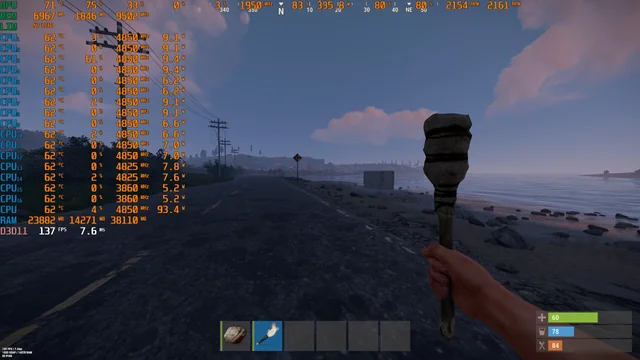
To find the bottleneck in Rust, monitor your CPU, GPU, and RAM usage while playing. Use performance tools to check how resources are being used. If your CPU is often at high usage, it could be the problem. Likewise, if the GPU or RAM is fully used, those could also be causing slowdowns.
Rust FPS Optimization Guide: Maximize Performance
To improve FPS in Rust, lower graphics settings, turn off V-Sync, and reduce Field of View (FOV). Close other apps, update your GPU drivers, and set Rust to high priority for smoother performance and better gameplay.
(RUST) PC not using all GPU, CPU, and RAM available – RTX 2080 TI with I9-9900k
If Rust isn’t using all of your GPU, CPU, and RAM, try setting your PC to “High Performance,” close other apps, update drivers, check for overheating, and adjust in-game settings for better hardware use and smoother gameplay.
FAQ,s
1. Is Rust more CPU- or GPU-intensive?
Rust is more CPU-intensive because it needs strong processing for tasks like world generation and player actions. However, a good GPU is also important for better graphics and smooth gameplay.
2. When you benchmark your computer, is it more CPU- or GPU-intensive?
When you benchmark your computer, it can focus on either the CPU or the GPU. CPU tests check processing power, while GPU tests measure graphics performance. Both are important for overall performance.
3. Does CPU matter when rendering with GPU?
Yes, the CPU is important when rendering with a GPU. It helps manage tasks like setting up scenes and data. A good CPU helps the GPU work faster and more smoothly.
4. Is streaming GPU- or CPU-intensive?
Streaming mostly uses the CPU because it handles video encoding and data. The GPU is important for game graphics. A balanced CPU and GPU help make streaming smooth.
5. Is Yuzu CPU or GPU intensive?
Yuzu uses the GPU mostly to display games well. It also needs the CPU for some jobs. Both parts are important, but the GPU does the main work for gaming.
6. Can you use a CPU like a GPU? If you can, will the results be optimal?
You can use a CPU for some tasks that a GPU does, but it won’t work as well. CPUs are good for complex jobs, while GPUs handle many simple tasks better. For best performance, it’s better to use each for its intended purpose.
7. How important are the CPU and GPU when building a gaming computer? Which one should be prioritized first if money isn’t an issue?
Both the CPU and GPU are very important for a gaming computer. If you have enough money, focus on the GPU first, as it greatly improves gaming performance and visuals.
8. What determines when a CPU or GPU is used?
A CPU is used for general tasks like calculations and running programs, while a GPU is used for graphics and video processing. The type of task decides which one is used.
9. What is good about the video game Rust?
Rust is exciting because it offers survival gameplay, open-world exploration, and teamwork. Players gather resources, build shelters, and face challenges together, making each game unique and full of surprises.
10. Does Rust Use A Lot Of CPU?
Yes, Rust uses a lot of CPU, especially when many players or actions are happening. A strong CPU helps the game run smoothly and improves your gaming experience.
11. Does rust depend on CPU or GPU?
Rust depends on both CPU and GPU. The CPU handles tasks like game logic and player interactions, while the GPU focuses on graphics. Both are important for good performance.
12. Do I Need a Good CPU for Rust?
Yes, you need a good CPU for Rust. It helps with game performance, especially during busy moments. A stronger CPU can make your gaming experience smoother and more enjoyable.
13. Is Rust A Heavy Game To Run?
Yes, Rust is a heavy game to run. It requires a good computer with a strong CPU and GPU to handle its large world and many players for smooth gameplay.
Conclusion
In summary, whether Rust is CPU- or GPU-heavy depends on your application’s requirements. For CPU-bound tasks like data processing and game logic, Rust shines due to its performance and memory management. For GPU-bound tasks like graphics rendering, Rust can also excel when using the right libraries. Balancing both resources effectively can lead to high-performing applications.
References:
- https://www.quora.com/What-streaming-service-offers-the-largest-selection-of-content
- https://www.quora.com/What-is-the-Rust-compilers-ownership-system-How-does-it-manage-memory
- https://www.quora.com/Is-Rust-more-CPU-or-GPU-intensive
